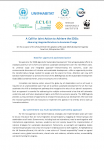Eight international organizations committed to coordinated action to achieve the 2030 Agenda for Sustainable Development, addressing a high-level side event on the sidelines of the UN Sustainable Development Summit.
The high-level event resulted in a joint call for action, in which the heads of the eight organizations say they are ready to step up their collective efforts to support SDG implementation, and commit themselves to engaging in multi-stakeholder partnership approaches and working across regions and on multiple levels, from local to global.
 26 September 2015: Eight international organizations committed to coordinated action to achieve the 2030 Agenda for Sustainable Development, addressing a high-level side event on the sidelines of the UN Sustainable Development Summit. The high-level event resulted in a joint call for action, in which the heads of the eight organizations say they are ready to step up collective efforts to support Sustainable Development Goal (SDG) implementation, and commit themselves to engaging in multi-stakeholder partnership approaches and working across regions and on multiple levels, from local to global.
26 September 2015: Eight international organizations committed to coordinated action to achieve the 2030 Agenda for Sustainable Development, addressing a high-level side event on the sidelines of the UN Sustainable Development Summit. The high-level event resulted in a joint call for action, in which the heads of the eight organizations say they are ready to step up collective efforts to support Sustainable Development Goal (SDG) implementation, and commit themselves to engaging in multi-stakeholder partnership approaches and working across regions and on multiple levels, from local to global.
‘A Call for Joint Action to Achieve the SDGs: Advancing Integrated Solutions to Accelerate Change’ was endorsed by the UN Environment Programme (UNEP), UN-Habitat, Local Governments for Sustainability (ICLEI), the Inter-Parliamentary Union (IPU), the International Union for Conservation of Nature (IUCN), the UN Convention on Biological Diversity (CBD), World Resources Institute (WRI), and the World Wide Fund for Nature (WWF).
Opening the event on 26 September 2015, Achim Steiner, UNEP Executive Director, underlined the ambition of the 2030 Agenda. He told participants that it will only be successful by mobilizing all actors, “with each and every one bringing to the table their respective strengths, capacities and resources.”
Mogens Lykketoft, UN General Assembly (UNGA) President, noted the need for multi-stakeholder platforms to address the cross-cutting and complex nature of the SDGs and avoid a silo approach. He said the UN’s three pillars of peace, security and development are “as interconnected as sustainability and development.”
Tsakhiagiin Elbegdorj, President of Mongolia, said new, better and more cooperative methods of funding sustainable development and boosting technology transfer will be needed.
Oyun Sanjaasuren, President of the UN Environment Assembly (UNEA) of UNEP, said the second meeting of UNEA will deliver on the environmental dimension of the 2030 Agenda. The meeting will include a high-level ministerial review session focused on “healthy environment and healthy people,” she said, and complement the High-level Political Forum on Sustainable Development (HLPF). Sanjaasuren also announced the launch of the UNEA.org online platform, which aims to facilitate multi-stakeholder engagement.
Naoko Ishii, CEO and Chairperson of the Global Environment Facility (GEF), stressed the need for a multi-stakeholder approach throughout the global supply chain in order to build a coherent incentive system for addressing unsustainable consumption and production patterns.
Hans Hoogeveen, Netherlands Ministry of Economic Affairs, said food production will need to increase by 60% to feed nine billion people, while one-third of the food produced every year and one-fourth of the water used in agriculture is being wasted. He noted that international initiatives, such as the Food Loss & Waste Protocol, will be necessary to achieve SDG target 12.3 (by 2030 halve per capita global food waste at the retail and consumer level, and reduce food losses along production and supply chains including post-harvest losses).
Eva Kjer Hansen, Denmark’s Minister for the Environment and Food, called for reforming how governance systems are built at the national, regional and global levels, by breaking the silos and engaging all stakeholders at all levels.
Andrew Steer, WRI President and CEO, underscored the need for: leadership by governments; ownership by nations; monitoring and focusing on the results; transparency and good governance; and partnerships.
In the joint statement, the organization heads also pledge to work together to strengthen and scale up multi-stakeholder partnerships for achieving the SDGs in fora such as the HLPF, UNEA’s second session, the IUCN World Conservation Congress, the UN Conference on Housing and Sustainable Urban Development (Habitat III), and the 13th meeting of the Conference of the Parties to the CBD. [IISD RS Sources] [UNEP Press Release] [UNGA President Remarks] [Joint Call for Action]